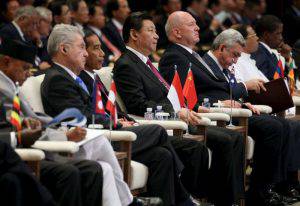China’s Xi: Trade between China and Silk Road nations to exceed $2.5 trillion
BEIJING (Reuters) — China’s President Xi Jinping said he hoped its annual trade with the countries involved in Beijing’s plan to create a modern Silk Road would surpass $2.5 trillion in a decade.

Xi also pledged to protect the interests of foreign companies in China amid investors’ rising concerns that Beijing is enacting policies that could hurt their businesses.
Under the so-called “One Belt, One Road” initiative, China aims to create a modern Silk Road Economic Belt and a 21st Century Maritime Silk Road to boost trade and extend its global influence. Commerce Minister Gao Hucheng said previously that more than 50 countries had shown interest in the initiative.
Projects under the plan include a network of railways, highways, oil and gas pipelines, power grids, Internet networks, maritime and other infrastructure links across Central, West and South Asia to as far as Greece, Russia and Oman, increasing China’s connections to Europe and Africa.
Speaking at the sidelines of a high-level event in the southern city of Boao on Sunday, Xi said the scheme would stimulate trade and investment between China and countries along the route, according to a statement on the foreign ministry’s website.
“We hope that the annual trade volume between China and these countries surpasses $2.5 trillion in a decade or so,” Xi told 40 company representatives from China and overseas.
By way of comparison, China’s trade with the European Union in 2013 amounted to 428.1 billion euros ($466.1 billion).
Chinese industries expected to benefit from the plan include agriculture and mining as the route encourages exploration for minerals.
In addition to trade efforts, China is seeking to boost its global influence by signing up countries to its Asian Infrastructure Investment Bank.
Xi, meanwhile, sought to address concerns from foreign businesses, which have complained of an increasingly tough business climate in the world’s second-largest economy.
“China will be more open. China’s policies that encourage the use of foreign investment will not change, and the protection of legitimate rights and interests of foreign-invested businesses will not change,” Xi said.
The United States is concerned about China’s restrictions on the use of foreign information technology equipment by the banking sector, according to a filing published by the World Trade Organization on Thursday.
New cyber-security regulations would force technology vendors to Chinese banks to hand over secret source code and adopt Chinese encryption algorithms.
U.S. companies have also cried foul over China’s oversight of monopoly and pricing issues and antitrust enforcement.
